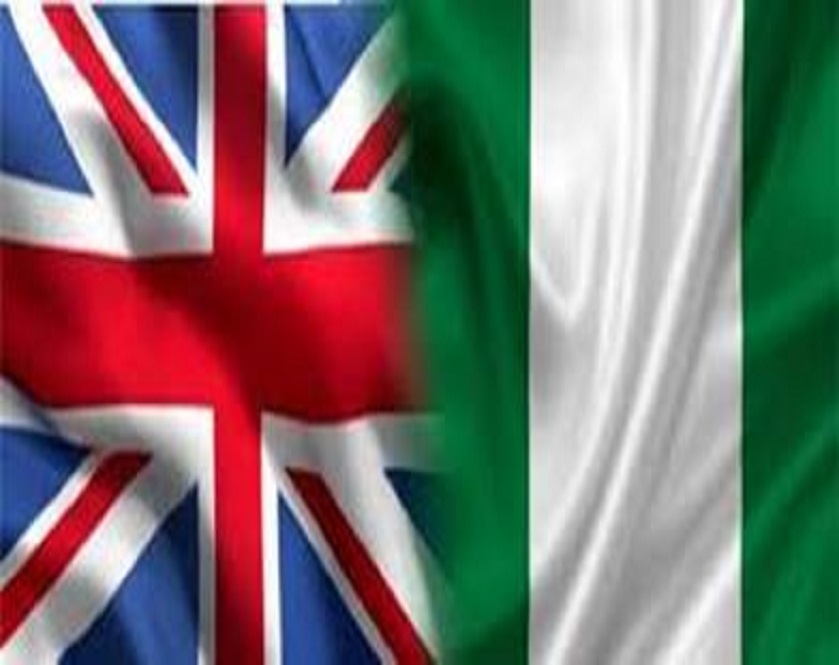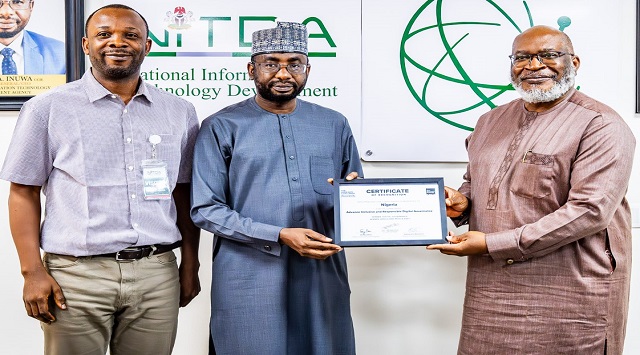News
UK Reaffirms Commitment to Strengthen, Deepen Trade Relation with Nigeria

The UK has reaffirmed commitment to strengthen and deepen its relationship with Nigeria, as both sides confirmed their shared interest in pursuing a potential Enhanced Trade and Investment Partnership at the eighth and final UK-Nigeria Economic Development Forum (EDF) which held today at the Transcorp Hilton Hotel in Abuja.

The EDF was launched by the former Prime Minister, Theresa May and President Muhammed Buhari in August 2018 and held bi-annually; serving as a platform to address market access barriers, respond to opportunities and challenges of doing business and boost bilateral trade and investment in our two countries.
Since 2018, the EDF has played a crucial role in strengthening the UK-Nigeria trading relationship and through this forum, both countries have been able to unlock finance, facilitate better regulatory link ups, support British and Nigerian businesses and engage on important global issues.
The total trade in goods and services (exports plus imports) between the UK and Nigeria currently stands at £5.5billion. Of this £5.5 billion: total UK exports to Nigeria amounted to £3.3 billion in the four quarters to the end of Q2 2022; while total UK imports from Nigeria amounted to £2.2 billion in the four quarters to the end of Q2 2022.
The agreement in the EDF Memorandum of Understanding (MoU) comes to a close today, and the UK and Nigeria agreed that the Enhanced Trade and Investment Partnership will offer an alternative high-profile mechanism to progress bilateral economic issues of mutual strategic importance, under which both sides will continue to work together to resolve market access issues and enhance economic cooperation.
UK International Trade Secretary, Kemi Badenoch said: “Nigeria is Africa’s largest economy and I’m delighted to see our trade and investment links grow, already worth £5.5 billion. The successes the EDF over the last four years has helped address crucial market access barriers and boosted our exchanges in key sectors such as Legal and Financial Services.
“I welcome the shared interest in exploring an Enhanced Trade and Investment Partnership between our nations that will open up new opportunities for UK and Nigerian business, create jobs and future-proof our economies against a changing world.”
UK Prime Minister’s Trade Envoy to Nigeria, Helen Grant said: “The UK and Nigeria go far when we go together. We are supporting Nigeria on the path to becoming a higher-growth, more inclusive and more sustainable economy as we move towards the 2023 elections.
“This is part of a wider push by the UK to drive a free trade, pro-growth agenda across the globe, using trade to drive prosperity and help eradicate poverty. A potential Enhanced Trade and Investment Partnership would include a series of commitments to tackle non-tariff market access barriers to deliver tangible results for businesses in both the UK and Nigeria“
The UK had recently launched the Developing Countries Trading Scheme (DCTS), one of the most generous preference schemes in the world, with enhanced preferences for Nigeria-UK Trade and Investment. The new scheme which will come into effect in early 2023, will cut tariffs on hundreds of everyday products from developing countries – this will be welcome news to Nigerian exporters.
It will equally extend tariff cuts to hundreds of more products exported from Nigeria and other developing countries, going further than the EU’s Generalised Scheme of Preferences. This is on top of the thousands of products, which Nigeria can already export to the UK duty-free.
Nigeria Minister for Industry, Trade and Investment, Otunba Adeniyi Adebayo CON said: “The EDF has been a fantastic forum and it is important that what comes out of the working group builds upon its principles and strengthens its outcomes.
“I know that both Nigeria and the United Kingdom have exchanged policy papers detailing how they wish to proceed, and I look forward to feedback as both papers are reviewed.
“Increased collaboration with Nigeria and other developing markets is needed to mitigate against both current and potential future supply-chain challenges. To this end, the introduction of the Developing Countries Trading Scheme (DCTS) is warmly welcomed. The reduction in tariffs on hundreds of everyday products should be a win for both Nigerian exporters and UK consumers who are able to access our products at a lower price.
“In 2021, UK exports to Nigeria were said to be $1.64 Billion and Nigerian exports to the UK $1.12 Billion. Not too far apart.
“As we move into 2023 it will be good to see the DCTS grow these numbers. Increasing bilateral trade is key for both nations and the agreement we are forging must strategically promote its increase. We must continue to work together to resolve market access issues and enhance economic cooperation.”
News
NITDA Partners OGP to Drive Presidential Digital Goals

The Director General of the National Information Technology Development Agency (NITDA), Kashifu Inuwa, CCIE, has reaffirmed Nigeria’s commitment to open governance, transparency and inclusive digital development as the Open Government Partnership (OGP) team formally presented the award and certificate received at the OGP Global Summit Spain 2025 to the Agency’s leadership.

Nigeria emerged as the overall global winner in the Digital Governance category in recognition of the country’s excellence in deploying digital tools and policies to strengthen government transparency, accountability, and citizen engagement. In addition, Nigeria received the Regional Award for advancing Open Digital Governance across Africa and the Middle East, reaffirming its leadership role in promoting open government principles and driving digital transformation across the region.
These recognitions were largely attributed to initiatives led by NITDA in collaboration with civil society partners, such as Dataphyte, which showcased innovative and inclusive approaches to digital governance at the summit.
The summit, which was organised in Vitoria-Gasteiz, Spain, brought together more than 1,500 high-level representatives of governments, civil society leaders, and policymakers from around the world to exchange experiences, best practices, and progress on open government initiatives and implementation on key issues.
Receiving the OGP delegation at NITDA, Inuwa described the recognition as a national honour rather than an institutional one, stressing that the award reflects Nigeria’s collective efforts across government, civil society and the private sector in advancing open governance principles through the digital space.
According to him, such global recognition comes with heightened responsibility to deliver on commitments made under the OGP framework.
“This is not just about NITDA. It is a national recognition, and every recognition comes with responsibility,” the DG said.
“If we fail to execute the commitments we have made, it will not only affect our image locally but also at the international stage. This is also not something NITDA can do in isolation,” he added.
Inuwa linked the achievement directly to the Renewed Hope Agenda of President Bola Ahmed Tinubu, noting that digital transformation, transparency, economic diversification, job creation and efficient public service delivery remain central presidential priority areas.
He emphasised that leveraging digital technologies to deepen openness and accountability aligns with national objectives of strengthening institutions, improving governance outcomes and building trust between government and citizens.
Highlighting the importance of collaboration, the NITDA boss underscored the role of the OGP platform as a catalyst for a strong multi-stakeholder approach in Nigeria’s digital ecosystem.
He called on civil society organisations, development partners, the private sector and other government institutions to provide technical expertise, guidance and sustained engagement to ensure effective implementation of agreed commitments.
“We need to leverage the OGP platform. We need your expertise, your guidance, your support and your commitment to hand-hold us in delivering on these commitments,” he said.
He further noted that “a multi-stakeholder approach in the digital space is critical to fostering a resilient ecosystem that delivers real value to citizens.”
Inuwa disclosed that NITDA has already begun internal reviews of its OGP commitments and has tasked its representatives, including Dr Rousseau, to work with colleagues to develop a clear execution strategy.
He proposed the creation of joint work streams with OGP stakeholders to support implementation, ensure accountability and keep all parties on track.
“We are humans. Oversight and collaboration help us stay focused. With commitment, nothing is impossible, and I believe these goals are achievable,” he added, assuring the delegation of NITDA’s readiness and political will to deliver on all agreed commitments.
Inuwa also welcomed the idea of engaging the political leadership of OGP, including the Honourable Minister of Budget and Economic Planning, with a view to briefing President Tinubu on the achievement. He noted that celebrating milestones is important, as it reinforces morale and demonstrates that Nigeria’s efforts in digital governance are gaining global recognition.
“It’s also good when there are wins, we should celebrate, because we too never knew that the little things we are doing are noticed not just within Nigeria, but globally, to the extent of earning us this award,” he asserted.
He concluded by expressing gratitude to the Nigerian National OGP Secretariat and the global OGP leadership, reaffirming NITDA’s commitment to strengthening collaboration and building a more productive working relationship that will translate open governance principles into measurable national impact.
Earlier in his remark, Mr Olusoji Apampa, who led the OGP deelegation, said the honours were earned through a strong partnership between government and civil society, with NITDA playing a critical role, particularly in commitments focused on improving digital governance in Nigeria.
Apampa expressed hope that the awards would serve as added momentum to deepen ongoing commitments under NITDA’s leadership and accelerate the practical implementation of reforms aimed at strengthening digital governance across the country.
News
PalmPay Launches N400 Million World Travel Carnival, Rewarding Users with Free Global Trips

PalmPay, Nigeria’s leading digital banking platform, has announced the launch of its ₦400 million festive rewards campaign, designed to reward users with cash prizes and fully sponsored international travel experiences for everyday transactions on the PalmPay app.

The campaign will run from December 17, 2025, to January 8, 2026. The campaign is designed to reward everyday transactions with extraordinary experiences. It runs alongside PalmPay’s Purple December brand campaign, which focuses on wrapping up the company’s key brand and community initiatives for the year.
At the centre of the rewards campaign is the PalmPay World Travel Carnival, an interactive card collection experience that allows users to earn city cards by completing transactions on the app. Users are required to collect five city cards – London, New York, Dubai, Sydney, and Cape Town and combine them into a World Card, which unlocks a share of the prize pool.
The more World Cards a user creates, the larger their share of the cash rewards. Any extra uncombined cards can be swapped with friends and other PalmPay users to help complete additional World Cards.
Beyond cash rewards, the Carnival also offers Free Global Trips. In each round, the top two users with the highest number of eligible transactions (₦100 and above) and at least one World Card will win an all-expense-paid international trip.
The travel grand prize covers:
- Visa fees
- Round-trip international airfare
- 5-day, 4-night hotel accommodation
- Side attraction
- Meal expenses
- Airport pick-up and drop-off
- All transportation for scheduled tour activities during the trip
Winners will be determined through a transparent leaderboard system, with prizes credited automatically at the end of each round on December 25, December 31, and January 8.
Participation is simple:
- Complete tasks on the PalmPay app, such as Airtime, Data, Transfers, and other specific transactions listed in the app, to earn cards.
- Collect all five city cards.
- Swap cards with friends to complete your collection.
- Combine cards to form a World Card and earn cash rewards.
- Perform more transactions to climb the leaderboard for a chance at the global trip prize.
To ensure fairness, PalmPay has instituted strict rules: no cheating, bots, fake accounts, or manipulation. Any violations may lead to disqualification or account bans. Additionally, the Free Travel Prize is limited to one per user throughout the campaign.
Speaking on the launch, Femi Hanson, Head of Marketing & Communication, “This festive rewards campaign is about turning everyday banking into meaningful value for our users. With the World Travel Carnival as the headline activation, we are reinforcing PalmPay’s promise of being the smarter way to bank—where smart financial decisions unlock bigger opportunities.”
News
REA, NBS Partner to Deliver Comprehensive Energy Data for Nigeria

The Rural Electrification Agency (REA) and the National Bureau of Statistics (NBS) have signed a Memorandum of Understanding (MoU) to conduct a nationwide energy survey aimed at closing long-standing data gaps in Nigeria’s power sector. The initiative is expected to guide policy, attract investment, and accelerate universal electricity access.

Signed in Abuja, the agreement establishes a National Energy Survey based on the Multi-Tier Tracking Framework (MTF), a globally recognized methodology that measures electricity access not only by grid connection but also by quality, affordability, reliability, and usage of electricity and clean cooking solutions.
The survey will be implemented under the Energy Sector Management Assistance Program (ESMAP) of the World Bank. Dr. Abba Aliyu, REA Managing Director/CEO, said the partnership underscores REA’s commitment to evidence-based rural electrification planning and will generate detailed insights on electricity access and off-grid solutions nationwide.
Prince Adeyemi Adeniran, Statistician-General of the Federation/CEO of NBS, emphasized that reliable statistics are essential for effective policymaking, assuring that NBS will provide technical oversight, sampling expertise, and quality assurance to meet global standards.
The survey will assess energy access, household affordability, expenditure patterns, and the adoption of off-grid technologies such as solar home systems, mini-grids, and clean cooking solutions. REA will provide sector expertise and policy alignment, while NBS manages regulatory approvals, methodology, and technical supervision.
Funded and technically overseen by the World Bank, the exercise will run for 18 months, with the resulting data expected to improve national energy planning, programme targeting, and private sector investment, particularly in underserved and rural communities.
Officials said the collaboration reflects the Federal Government’s commitment to strengthening inter-agency coordination, enhancing energy data availability, and advancing Nigeria’s goal of universal electricity and clean cooking access.

 E-Business3 days ago
E-Business3 days agoNigeria Police Arrest Okitipi, Nigerian Allegedly Linked to Microsoft 365 Hack

 E-Financial3 days ago
E-Financial3 days agoWorld Bank to Approve $500m Loan for Nigeria Today

 News3 days ago
News3 days agoNITDA Partners OGP to Drive Presidential Digital Goals

 E-Financial3 days ago
E-Financial3 days agoCustoms Slam 3 Percent Surcharge on Banks over Delayed Revenue Remittance

 Telecom3 days ago
Telecom3 days agoWhy Econet Wireless is Switching to VFEX

 General News2 days ago
General News2 days agoJumia Kicks Off December Holiday Sale, Bringing Festive Deals to Shoppers Nationwide

 E-Financial2 days ago
E-Financial2 days agoAccess Holdings Shareholders Approved to Raise N40bn Capital Through Private Placement

 Broadcasting2 days ago
Broadcasting2 days agoNIMC rolls out Pre-Enrolment Portal for seamless NIN registration

























